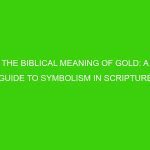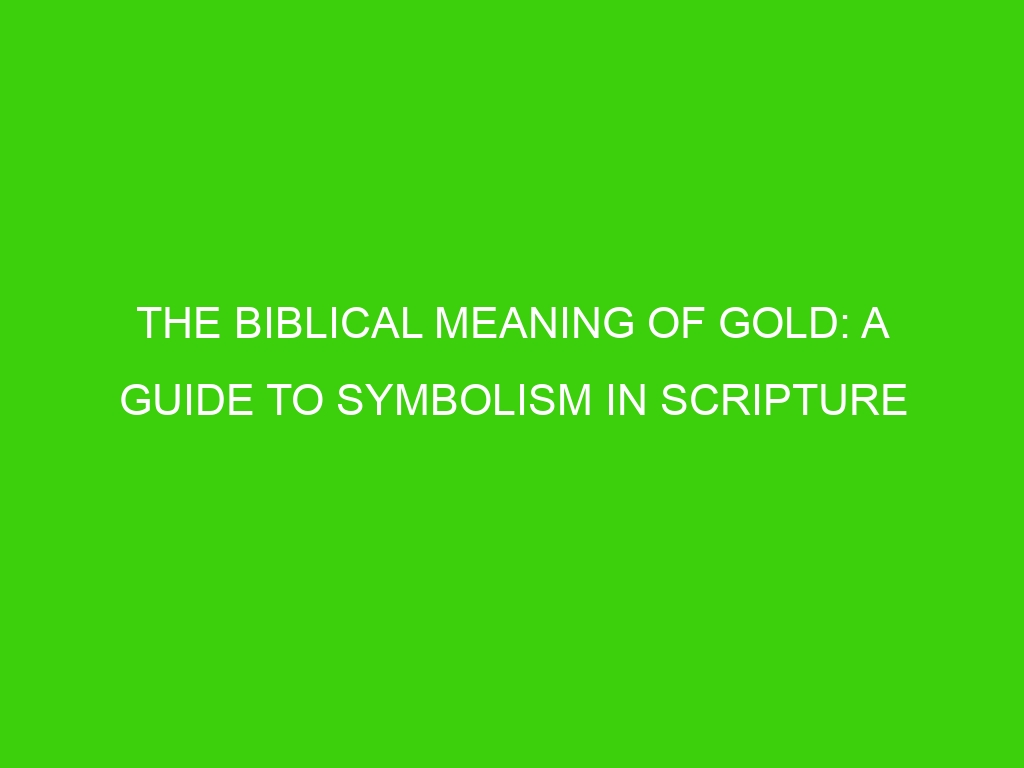Have you ever wondered about the deeper meaning of gold in the Bible? As you crack open those dusty pages, golden images leap out.
But what do they symbolize? In this guide, we’ll explore the biblical meaning of gold from Genesis to Revelation.
You’ll uncover how gold signifies divinity, wealth, greed – even idolatry.
We’ll see how Pharaoh lavished Joseph with gold necklaces, how the Israelites crafted a golden calf, and how the New Jerusalem glitters with the sheen of gold.
As we mine the Scriptures, you’ll discover the rich symbolism of this precious metal woven throughout God’s Word.
So come along as we excavate the biblical meaning of gold from cover to cover!
Gold in the Bible: A Precious Metal Full of Meaning
Gold holds special significance in the Bible.
This precious metal is mentioned over 400 times, used as a symbol of value, beauty, purity, and deity.
A Symbol of Wealth and Status
In ancient times, gold was a measure of wealth and status.
Possessing gold meant prosperity, importance, and influence.
The Bible reflects this, using gold to signify the wealth and prominence of kings and kingdoms.
King Solomon accumulated vast amounts of gold, demonstrating the glory of his reign.
A Symbol of Beauty and Purity
Gold’s striking appearance and resistance to corrosion led to its association with beauty, perfection, and purity in Scripture.
The tabernacle and temple were adorned in gold, representing the beauty of holiness.
Gold is also used metaphorically to represent moral purity, as in Psalm 19: “The ordinances of the Lord are pure, enlightening the eyes…more precious than gold.”
A Symbol of Deity and Divinity
Gold’s value and perfection also made it a fitting symbol for God and divine things.
The Ark of the Covenant and cherubim were made of gold, representing God’s holy presence.
In the New Testament, gold symbolizes the deity of Jesus, as in Revelations 1 where Jesus’ feet are described as like “burnished bronze, refined as in a furnace, and his voice was like the roar of many waters…and his face was like the sun shining in full strength.”
The Bible’s use of gold is a shining reminder of what we should value and pursue above all else: the wealth of God’s grace, the beauty of holiness, and the perfection of Christ.
Gold, precious as it is, fades in comparison to these divine riches.
Symbolic Representations of Gold in Scripture
Gold has always been a symbol of wealth, glory, and divinity in the Bible.
In the Old Testament, gold was used to decorate the Ark of the Covenant and the Temple of Solomon.
This conveys the preciousness and importance of God’s presence.
The streets of heaven are also described as being paved with gold, emphasizing the city’s beauty, splendor and value.
Gold crowns and ornaments were worn by kings and priests, symbolizing power, status and holiness.
Daniel prophesied that the Messiah would be given dominion, glory and kingship, with people of all nations serving him – this is represented by the gold of his kingdom.
The magi brought the baby Jesus gifts of gold, recognizing his royal identity and purpose.
Gold is also a symbol of refinement, purity and faith tested by fire.
In Scripture, the number seven symbolizes completeness or perfection.
Psalm 12 says that the words of the Lord are like silver purified seven times in the fire.
1 Peter 1 compares the testing of our faith to the refining of gold, producing purity, genuineness and praise.
This imagery illustrates how suffering and trials can strengthen us and deepen our faith.
The radiance and warmth of gold parallel the light and love of God.
James 1 describes God as the father of lights, with whom there is no variation or shadow.
1 John 4 says that God is love, and that perfect love casts out fear.
The golden glow of the divine presence brings comfort, joy, revelation and transformation.
Gold’s preciousness and imperishability also make it an apt symbol for the eternal, incorruptible nature of God and his kingdom.
In Scripture, gold richly represents the glory, holiness, purity, light, love and eternal nature of God.
Its radiance illuminates our understanding, and its enduring beauty gives us a glimpse of the heavenly kingdom to come.
Gold as a Heavenly Treasure and Sign of God’s Glory
Gold holds a special meaning in the Bible as a symbol of heaven’s splendor and God’s majesty.
The streets of the New Jerusalem are “pure gold, like transparent glass” (Revelation 21:21).
Gold decorates the tabernacle, temple, and priestly garments, illustrating the glory and holiness of God.
A Precious Metal Fit for a King
In ancient times, gold was a precious metal valued for its beauty, scarcity, and durability.
It was a symbol of wealth, status, and power.
As such, it was the only material fitting to represent the glory and majesty of the King of Kings.
The Ark of the Covenant and the utensils used in worship were made of pure gold, representing the perfection and holiness of God.
A Glimpse of Heaven
The lavish use of gold in the tabernacle and temple provided a glimpse of the splendor of God’s heavenly kingdom.
The streets of the New Jerusalem are “pure gold, like transparent glass” (Revelation 21:21).
This suggests that gold in heaven will be plentiful, beautiful, and untarnished.
The brilliance will reflect the light and glory of God, giving the city a golden glow.
Crowns and Rewards
Gold crowns and treasures feature prominently in descriptions of heavenly rewards.
The 24 elders in Revelation 4:4 are wearing “golden crowns on their heads.” Paul speaks of believers earning “the crown of righteousness” (2 Timothy 4:8) and an “imperishable crown” (1 Corinthians 9:25).
These crowns represent victory, honor, and eternal life in the kingdom of God.
The treasures we accumulate on earth will pass away, but our “treasures in heaven” are eternal (Matthew 6:20).
In Scripture, gold symbolizes the glory, splendor, and rewards of God’s eternal kingdom.
Although valued in this world, its earthly worth pales in comparison to its heavenly significance.
Gold points us to the King of Kings, encourages us to pursue heavenly treasures, and gives us a glimpse of the glories that await us for eternity.
The Purifying and Refining Nature of Gold in Biblical Stories
Gold is mentioned numerous times in the Bible, and it often symbolizes purity, glory, and divinity.
As the most precious metal known to ancient civilizations, gold was associated with holiness, royalty, and the divine.
The Golden Calf
In Exodus, when Moses went up Mount Sinai to receive the Ten Commandments, the Israelites grew impatient and built an idol of gold in the shape of a calf to worship.
This “golden calf” represented the impurity and idolatry that had infected the Israelites in Moses’ absence.
The gold symbolized the people replacing God with an idol made of man’s wealth and prosperity.
The Refiner’s Fire
The process of refining gold by fire is used as a metaphor for spiritual purification in the Bible.
According to Proverbs 17:3, “The refining pot is for silver and the furnace for gold, but the Lord tests the hearts.” The intense heat of the furnace separates the pure gold from the dross, just as God uses trials and hardship to refine our faith and character.
The gold that emerges is more precious, just as our faith is strengthened by difficulties.
The New Jerusalem
In Revelation, the heavenly city of New Jerusalem is described in radiant terms, with streets of “pure gold, like transparent glass.” The gold here represents the purity, glory and divinity of the eternal kingdom of God.
The earthly wealth and prosperity symbolized by gold are transformed in the New Jerusalem into the purity, holiness and glory of God’s presence.
Gold in the Bible reminds us of God’s power to purify, refine and sanctify.
Though the earthly wealth gold represents is fleeting, God can use it as a metaphor for the eternal riches of His kingdom.
The golden calf warns us against worshipping idols of materialism, while the refiner’s fire shows how God uses hardship to purify our faith.
The New Jerusalem gives us a glimpse of the glory, purity and divinity of God’s presence.
Gold in Prophecy and Revelation: A Glimpse of the New Jerusalem
The Golden City
In Revelation 21, John describes seeing “the holy city, new Jerusalem, coming down from God out of heaven, prepared as a bride adorned for her husband.” This city is described as being made of pure gold, like “pure glass.” The street of the city was also of gold, “like transparent glass.” Gold symbolizes the purity, glory, and divinity of the New Jerusalem.
Streets of Gold
The gold-paved streets point to the lavish abundance and prosperity of the city.
Gold was a precious metal in John’s day, so gold-paved streets would have seemed an extravagant and impossible detail, underscoring the sublime beauty and value of the New Jerusalem.The gold may also represent the radiance, glory and splendor of God Himself.
The Glory of God
The city shines with the glory of God, and its golden radiance is like that of God’s presence.
In Exodus, Moses’ face shone with radiance after encountering God’s glory on Mount Sinai.
The gold of the New Jerusalem similarly reflects God’s majestic splendor and holiness.
A Glimpse of Eternity
The gold-drenched images of the New Jerusalem give us a glimpse of the eternal home God is preparing for us in heaven.
The lavish details point ahead to the unimaginable beauty and riches that await believers in eternity with God.
While the prophecy highlights the gold and riches, the greatest treasure of heaven will be enjoying unhindered fellowship with God Himself.
The gold-filled depiction of the New Jerusalem in Revelation gives us a glimpse of the glory, abundance, and divine presence that await us for eternity in heaven.
The gold points us ahead to the unparalleled riches of knowing and enjoying God fully.
What a day that will be, when we walk on streets of gold in the City of God!










